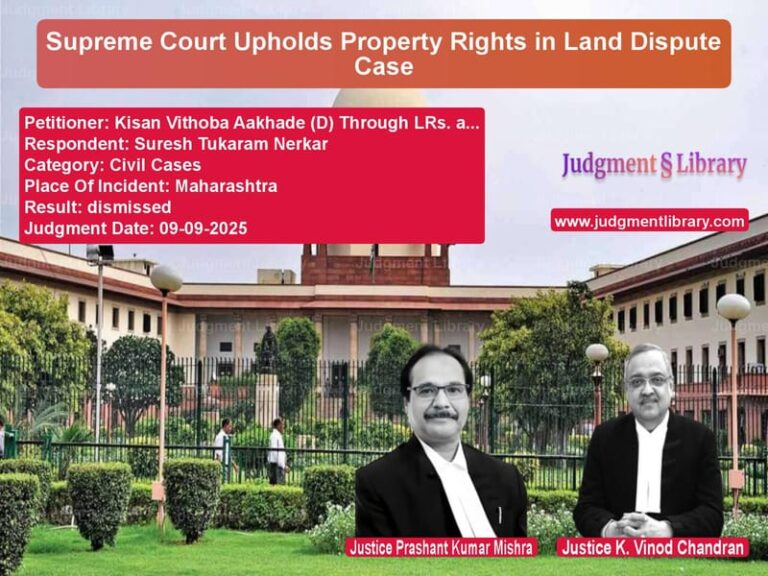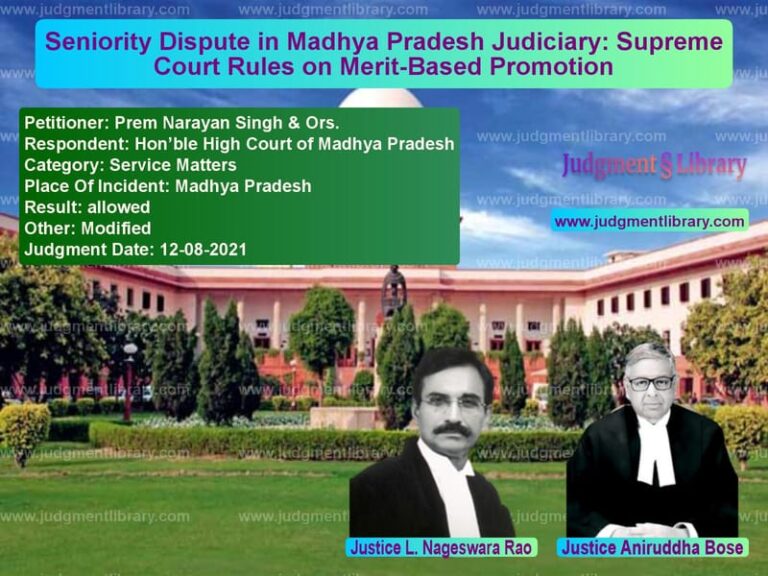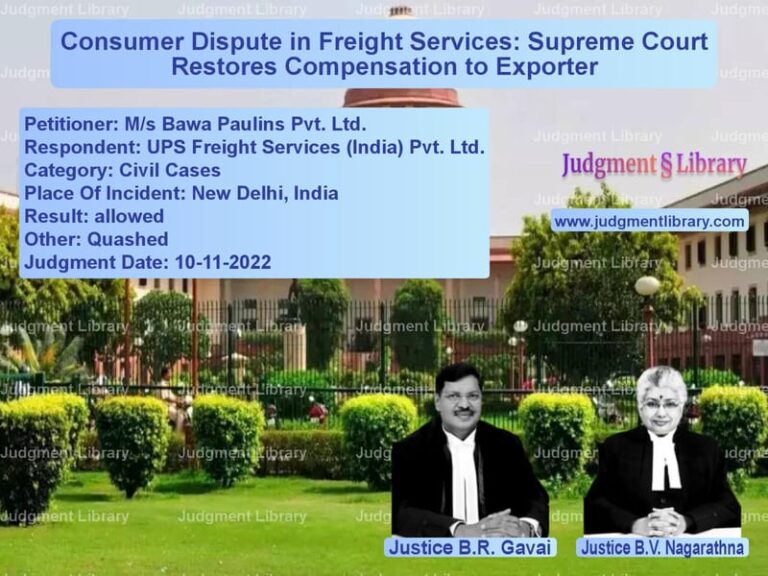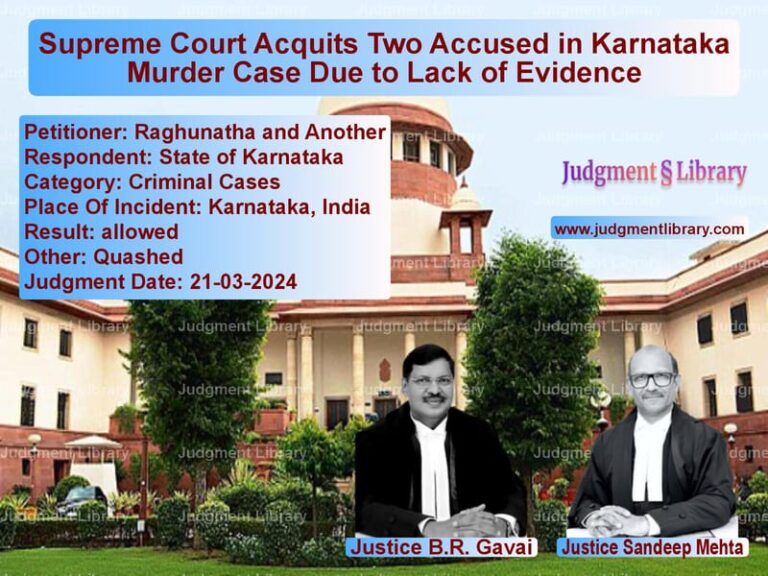Motor Accident Claim: Supreme Court’s Ruling on Liability and Compensation in Case of Vehicle Permit Violation
The case of Gohar Mohammed vs. Uttar Pradesh State Road Transport Corporation & Ors. is a significant judgment from the Supreme Court concerning compensation in road accident cases. The matter involved an appeal by the appellant, Gohar Mohammed, against the decision of the High Court of Allahabad, which had upheld the compensation order passed by the Motor Accident Claims Tribunal (MACT). This case highlights crucial aspects regarding the validity of vehicle permits, insurance liability, and the interpretation of rules under the Motor Vehicles Act, 1988, and its amendments.
The appellant contested the liability imposed on him for the accident that occurred on July 29, 2012, which resulted in the death of a young man, the deceased, who was a managing director at DRV Drinks Pvt. Ltd. The accident occurred when the deceased’s car was struck from behind by a bus owned by the appellant, resulting in severe injuries to the deceased, who died before reaching the hospital. The appellants in this case were the owner of the offending bus and the insurance company.
Factual Background of the Case
The accident occurred on a bypass road near Sanhwali village in Uttar Pradesh. The deceased, aged 24, was traveling from his factory to his residence when his car was rear-ended by the appellant’s bus. The FIR was lodged against the driver and owner of the offending vehicle, and a claim for compensation of Rs. 4.19 crores was filed by the deceased’s legal heirs.
At the Motor Accident Claims Tribunal, the claimants sought compensation under Section 166 of the Motor Vehicles Act. The MACT granted compensation of Rs. 31,90,000/- along with 7% interest, after considering the income of the deceased and applying the appropriate multiplier. However, the issue of liability was contentious, as the appellant argued that the vehicle was being operated within the terms of its permit. This was contested by the insurance company and the state, who argued that the vehicle violated the terms of the permit, and thus, the liability for compensation rested with the appellant.
Appellant’s Arguments
The appellant, represented by Advocate J. K. Maheshwari, contended the following:
- That the offending vehicle was insured and the insurance company should be liable to compensate the claimants.
- That the appellant had a valid special temporary authorization (permit) to operate the vehicle on the route where the accident occurred, and that the alleged violation of the permit was not sufficient to impose liability on the appellant.
- That the FIR and other documents submitted were insufficient to prove that the vehicle was operating beyond the approved route, and the insurance company should indemnify the appellant.
Respondent’s Arguments
The insurance company, represented by Advocate A.N. Venugopala Gowda, countered the appellant’s arguments by stating:
- That the vehicle was not being operated as per the terms of the permit issued by the Transport Authority.
- That the appellant failed to prove the validity of the permit and the vehicle was being used on a route different from the one approved.
- That the appellant’s failure to produce the original permit and the inconsistencies in the permit documentation were sufficient to hold him liable for the accident.
Supreme Court’s Observations
The Supreme Court, after reviewing the facts of the case, made the following key observations:
- The vehicle’s permit was not valid for the route where the accident occurred. The appellant had failed to produce the original permit or provide a satisfactory explanation regarding the discrepancies in the permit documents.
- The issue of liability was clear, as the vehicle was operating in violation of the terms specified by the Transport Authority and the insurance policy.
- The appellant’s claim that the vehicle had a valid temporary permit was not supported by sufficient evidence, and the claims regarding the payment of the fee for the permit were not convincing.
- The Court agreed with the MACT’s decision to hold the appellant liable for compensation, as the vehicle was operated outside the permissible terms of its permit.
Supreme Court’s Judgment
The Supreme Court, after analyzing the case, upheld the decision of the High Court and the MACT, affirming the appellant’s liability to pay compensation. The judgment emphasized that:
“The vehicle was not plying according to the terms and conditions of the permit and thus the appellant, as the owner of the vehicle, is liable for the compensation.”
The Court found that the failure to produce the original permit and the discrepancies in the documentation were sufficient to confirm the violation of the permit’s terms. As a result, the appellant was ordered to pay the compensation, and the insurance company was directed to recover the amount from the appellant.
Legal Precedents Considered
The Supreme Court relied on several legal precedents in its decision, including:
- National Insurance Co. Ltd. vs. Nitin Khandelwal: Clarifying the scope of liability under insurance policies in cases of permit violations.
- Rani Sharma vs. United India Insurance Co.: Discussing the liability of vehicle owners and insurance companies in the case of accidents involving vehicles operated outside their permitted routes.
- Rajesh Tyagi v. Jaibir Singh: Emphasizing the need for strict adherence to permit conditions in motor accident claims.
Conclusion
The Supreme Court’s judgment in Gohar Mohammed vs. Uttar Pradesh State Road Transport Corporation reinforces the principle that vehicle owners must comply with the terms of permits and insurance policies. Any deviation from the prescribed route or violation of permit conditions can result in the owner being held liable for accidents. This ruling is significant for future claims under the Motor Vehicles Act and sets an important precedent regarding the validity of permits and the responsibility of vehicle owners.
Petitioner Name: Gohar Mohammed.Respondent Name: Uttar Pradesh State Road Transport Corporation & Ors..Judgment By: Justice J.K. Maheshwari, Justice S. Abdul Nazeer.Place Of Incident: Sanhwali Village, Uttar Pradesh.Judgment Date: 15-12-2022.
Don’t miss out on the full details! Download the complete judgment in PDF format below and gain valuable insights instantly!
Download Judgment: gohar-mohammed-vs-uttar-pradesh-state-supreme-court-of-india-judgment-dated-15-12-2022.pdf
Directly Download Judgment: Directly download this Judgment
See all petitions in Road Accident Cases
See all petitions in Compensation Disputes
See all petitions in Negligence Claims
See all petitions in Judgment by J.K. Maheshwari
See all petitions in Judgment by S. Abdul Nazeer
See all petitions in dismissed
See all petitions in supreme court of India judgments December 2022
See all petitions in 2022 judgments
See all posts in Accident Cases Category
See all allowed petitions in Accident Cases Category
See all Dismissed petitions in Accident Cases Category
See all partially allowed petitions in Accident Cases Category







